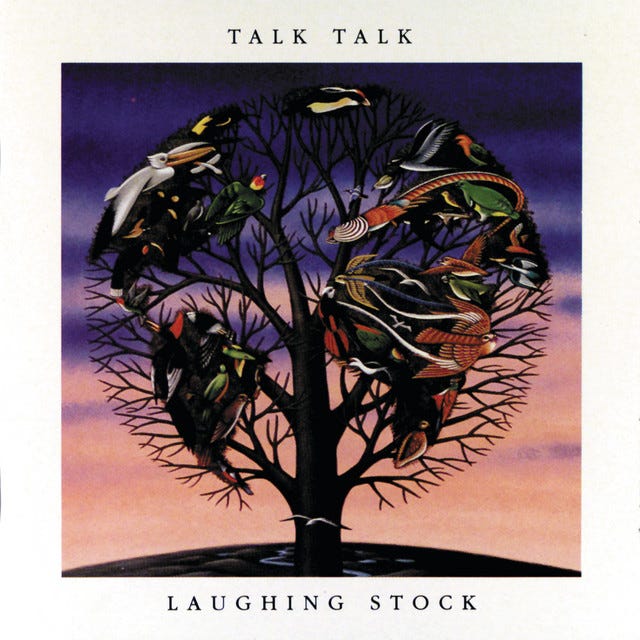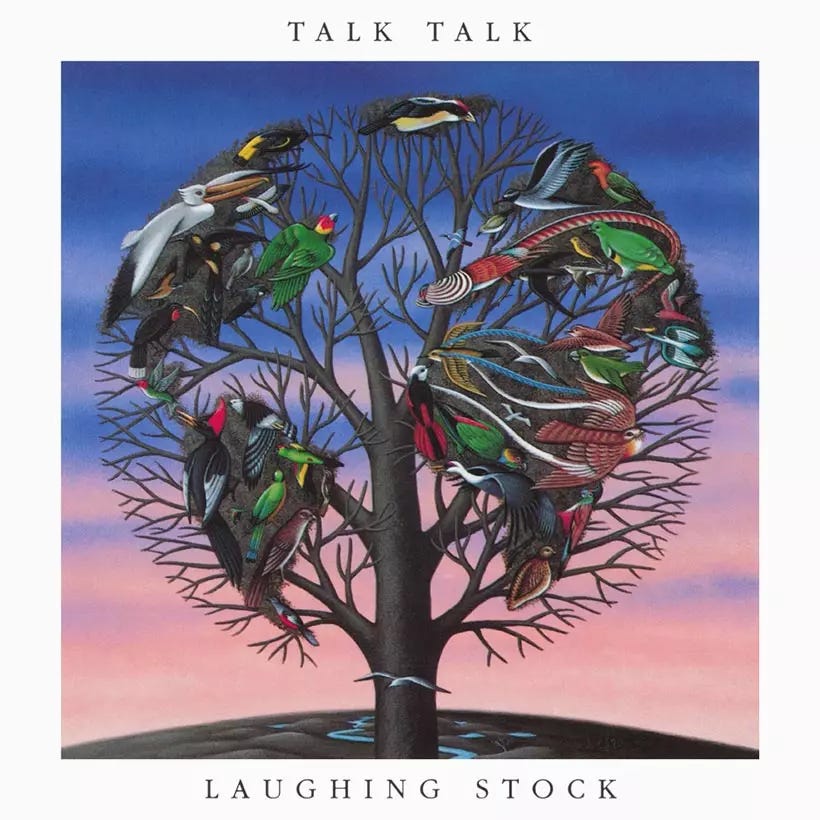
Note: For this year’s project, I’ve taken on the challenge of reviewing 100 new (to me) records. This is the latest in that series, and was suggested by On Repeat reader William Collen.
These deeper dives are normally only available for paid subscribers, but I’ve dropped the paywall for this edition. If you’re enjoy it and would like to read more, please consider a paid subscription.
What’s a band to do when it hits its commercial peak? Keep climbing, or use the runway you have to make the record you’ve always wanted to? Either option is a gamble, and music history is littered with groups that executed poorly.
In the mid-to-late 80s, Talk Talk was flying high, enjoying both commercial & critical success. Starting out as a synth-pop band, they first hit with “Talk Talk” off of their debut record 1981’s The Party’s Over.
The party wasn't over of course, and the group followed that with 1984’s “It’s My Life,” whose title track was a top 10 hit in Europe and cracked the top 40 here in the US (heresy alert: I like the No Doubt version better). Sorry, not sorry.
1986’s Colour of Spring saw the band pivot away from the poppier sounds of the previous 2 records, moving toward more acoustic instruments and influence, as evidenced on tracks like “Life Is What You Make It.” The record didn't sell as well stateside as its predecessor. That said, it went on to become the band’s highest-selling studio record.
From the start, the band seemed a little out of place on a roster with groups like Duran Duran or Heaven 17, and more in common with jazz & avant-garde artists like Roxy Music. That duality would end up paying off, but a radical shift always seemed in the offing, just out of frame.
That came to pass with Talk Talk’s next record, 1988’s Spirit of Eden. Skinny ties and synth were shed, and influences of jazz greats like Davis, Coltrane, and more had taken their place. Mark Hollis later attributed the use of synthesizers to financial issues–they were more easily affordable–but that success unlocked their label’s purse strings allowing the group to hire additional musicians. It also allowed them to indulge their tastes, and wander down all sorts of experimental paths.
Previous commercial success may have bankrolled this next record, but it didn't mean fans & critics came along as part of the deal. Writing for NME, Simon Williams wrote that he found the album 'aimless' but admitted, "they're resolute and determined, flaunting commercial rules with fascinating disregard for understanding or acceptance.”
The trend began with Colour of Spring, gained momentum with Spirit of Eden, and hit critical mass with 1991’s Laughing Stock.
With their label guaranteeing both full funding and a hands-off approach, recording what would ultimately be the band’s 5th and final LP became an exercise in excess. Not in the usual debauched rock and roll context; rather in a musical nee. From quirky musical side trips to playing with time/space to having dozens (!) of musicians come in to play on the record (though just under 20 made the final cut).
It’s hard to believe something so unwieldy was ever completed.
But it was, and what came out of North London was a record unlike pretty much anything else the band had ever done–or anything else available at teatime.
With just 6 tracks spanning almost 45 minutes, each is expansive. Vast yet nuanced. The opener, “Myrrhman” feels like walking through a moonlit desert, or being in a nightclub for 2 drinks too many… It’s desolate. Almost morose.
Place my chair at the backroom door
Help me up
I can't wait anymore
Blessed love
The love I've seen
Stair by idle stair
Faith one path & the second in fear
A half wit am I read
And tread dependence beneath my feet
Step right up something's happening here
We’re a long way from “Talk Talk.”
“Ascension Day” follows, and the mood is, well, ascending. Its chaotic rise is fueled by upright bass, giving it an almost jazzy feel. Pitchfork called the track, “the band's most chaotic and vicious song, like a small jazz combo being elbowed aside by a noise-rock band, with a climactic barrage of drumming that falls on your ears like an avalanche before the audible tape-splice cuts it dead.”
That seems a bit much…but also accurate?
“After The Flood” is next, and at just over 9 minutes is only the 2nd longest track on the record. It takes every bit of that 9 + minutes to say what needs to be said. The song feels revelatory, with strangely soothing waves rolling over you. There’s also a droning chord/that holds on for what seems like eternity.
Midway on a record seems like an odd place for a denouement, but here we are.
“Taphead” is notable more for its sound. Or rather Hollis’ quiet/frail vocals. Despite itself it builds into a dirge-y (is that a word?), swirling finale. This is Radiohead before Radiohead.
If this record is a parable for the circle of life, we’re listening to the end.
And if “Taphead” is the end, “New Grass” is the rebirth. A new beginning. Spartan yet alive. This is what should’ve been playing on the time-lapse videos of plants blooming we all watched in science class.
There is a theory that this record reflected Hollis's religious beliefs. That’s not for me to say, but with a verse like this it’s hard to ignore
Lifted up
Reflected in returning love you sing
Heaven waits
Someday Christendom may come
Westward
Evening sun recedent
Set my resting vow
Hold in open heart
To my ear, “New Grass” also invoked hints of Deep Forest’s “Sweet Lullaby.” YMMV.
Runeii marks the end of the record, and much like someone looking back at a long adventure, it’s meditative. If the other tracks are about a man’s relationship with God, this seems to be the other way around, written from God’s perspective
Well aren't you success
In answer select
Apologies met
An effigy blessed
In music circles, universally well-regarded records often fall into one of 2 categories; The record is genuinely well done and lauded on its merit. Or everyone says they like it because they think that’s what they’re supposed to do.
That Overton window only narrows when it’s the band’s swan song or the lead singer is no longer with us. Or both. Music geeks don’t speak badly of well-loved bands that have ended. No one speaks ill of the dead.
So where does that leave Laughing Stock? How do you categorize a record that went out of its way to not fit in any box?
In retrospect, it’s certainly become well-loved, with many calling it the band’s best work and holding space on a lot of Best Of lists.
Is some of that down to Mark Hollis's far-too-soon 2019 passing? Maybe. Probably, even. But I think much of it comes down to sound. And by sound I literally mean sound. This is a record that sounds amazing, even if one doesn’t like the music itself.
For all the strife and excess that may have gone into its production, a clean crisp soundscape came out of it. The rooms may have been crammed with musicians, but not a single note seems crowded or stepped on here. Everything is distinct with every note holding its own space.
In the end, most bands just want to produce the best work they can. To progress. Iterate. It’s clear that Talk Talk accomplished that with Laughing Stock.
Click the record to listen on the platform of your choice.
What do you think? Did I get this right, or did I miss the mark?
Have a record you think needs to be on this list? Leave a comment below, or hit reply to this email!
Thanks for being here,
Kevin—
P.S. Lively up your inbox! Every day The Sample forwards you a newsletter to discover. The more you use it, the better it gets at delivering what you want.






Hey Kevin, I'm a regular substack reader but found you in the outer wilds of the internet via a search for "Taphead" by Talk Talk. Finally tracked you to here which is a safe space for me :).
It's 1.45am, I'm doing my work thing, and I like some vinyl when I'm coding. It forces me to stand up every 25 minutes which isn't much but betters 8 hours of numb spotify streams.
Anyway someone had given me the Talk Talk LP.
And I really like this track. It does bring a radiohead premonition, but also has the subtlest (beautiful) jazz backing, and a maybe-talktalk-exclusive sound that reminded of those "animals and pouting dude" videos they made when I was a kid. Very empty and sad yet beautiful and uplifting. I think it's a special song. (Maybe a top ten IML, at least for now. )
Haven't looked at your other writing, but looking forward to doing so
My favorite track on the album is "After the Flood". The density of the arrangement is astounding; it took me years of listening before I noticed certain parts. Although it is nine minutes long, it doesn't feel tedious at all; on the contrary, it feels much shorter than it actually is. The lyrics "shake my head / turn my face to the floor" express a strange emotion of shame, and the following extended noise solo almost feels like a wordless cry from the heart. Brilliant. I'm glad you enjoyed it! Quite a lot going on for those who are willing to be patient and allow multiple listens to absorb this album's richness.